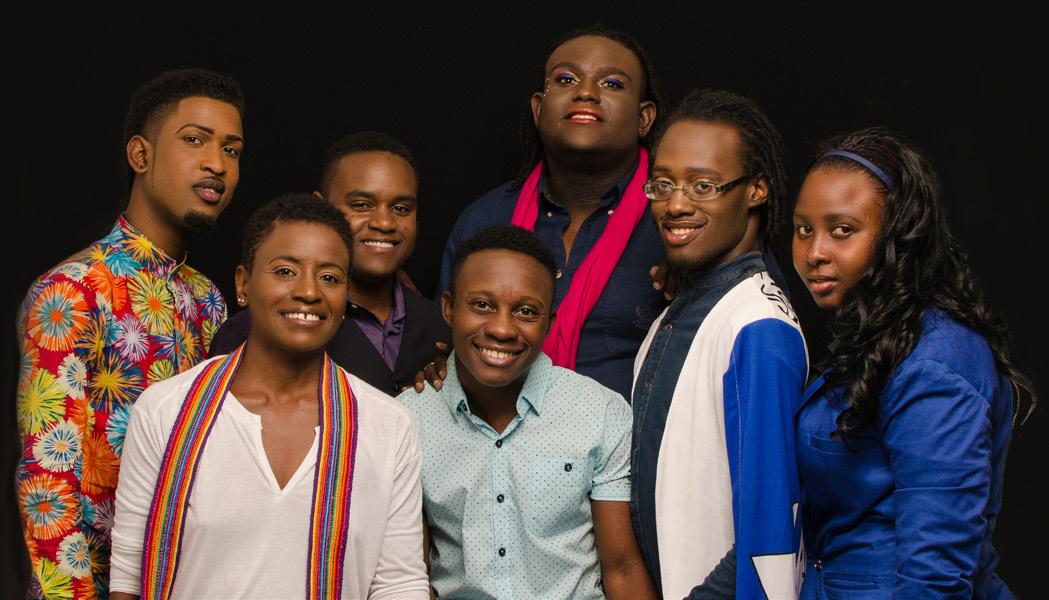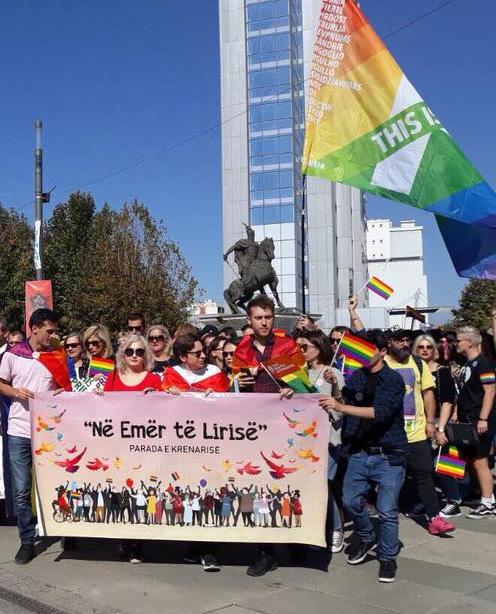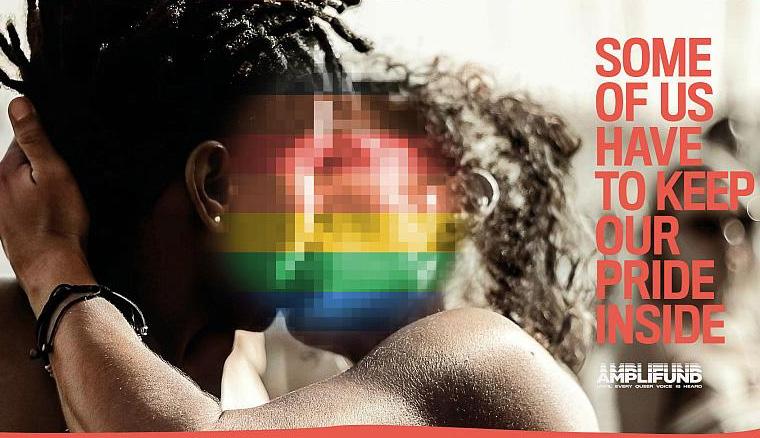
15 minute read
4. Best practices from the field
from Pride With Purpose: How Businesses Can Support the Global Movement for LGBT Human Rights
by GiveOut
The TransWave team, 2019. “If trans people are to survive and thrive in Jamaica, businesses should form close partnerships with trans organisations and provide forms of sustainable support to ensure we are adequately funded and resourced.”
MX Williams, Associate Director, Communications & Outreach, TransWave Jamaica
Advertisement
In the Global North there has been tremendous positive progress in recent years, with many businesses actively supporting local LGBTQI causes, ranging from sponsoring Pride events to campaigning for marriage equality. Many groups and individuals (including LGBTQI activists, employees, and consumers) continue to exert pressure on businesses to authentically support LGBTQI equality and inclusion. However, the challenge for multinational companies lies in implementing those policies uniformly and internationally. For real and lasting change and to avoid accusations of "pinkwashing", businesses need to behave in this way both consistently and in all countries of operation (whether LGBTQI friendly or not). One of the ways businesses can show their true and authentic support for LGBTQI equality and inclusion is through supporting LGBTQI organisations working in the most difficult places to be LGBTQI. We outline below some of the noteworthy practices around business support for LGBTQI human rights organisations identified through our research.
Take the lead from LGBTQI organisations
In most contexts, local LGBTQI organisations will be closer to the struggles of LGBTQI communities than businesses. Local insight and knowledge can be vital to ensure the success of local action and avoid counterproductive interventions – or even backlash against LGBTQI groups. Local organisations have the requisite knowledge and can be astute at navigating the local complexities. Some of the businesses that we interviewed acknowledged the challenges in this context. Involvement in public advocacy is often carefully considered, including whether it is safe to do for LGBTQI people in-country (including those not working with the business or associated with it), the views of any local LGBTQI organisations/networks, and any planned activity of clients or other leading LGBTQI inclusive employers in the region/country.
Case Study: Sustainable Support in South Africa “It is vital that your support is guided by the expertise and insights of LGBTQI activists and organisations on the ground – only then will the partnership be safe and lead to genuine, long-term change. Nothing about us without us.”
Shekeshe Mokgosi, Head of Operations, The Other Foundation
In 2018, Shell invited The Other Foundation (a Southern African charitable organisation that advances equality and freedom through grant making, with a particular focus on sexual orientation and gender identity) and other LGBTQI organisations to take a permanent seat at a new roundtable group with businesses. The initiative aimed at ensuring meaningful collaboration and coordination of sustainable support for the LGBTQI movement in South Africa. The creation of the group was inspired by the African proverb: “If you want to go fast, go alone. If you want to go far, go together.” The roundtable has proven important not only in sharing knowledge and best practices to improve the internal diversity and inclusion policies of participating businesses, but has also acted as a springboard to provide longterm financial and in-kind support to LGBTQI organisations. At the roundtable LGBTQI organisations can voice which forms of support are appropriate and most needed, and businesses can fill those gaps and pool their resources together, so that they go further and have the most impact. The diversity of sectors and perspectives
present at the roundtable – including financial, legal and technological – combined with input from participating LGBTQI organisations, has allowed for innovation and the development of more effective forms of partnership. The types of support that have come out of the roundtable include: • Offering free classes and workshops to LGBTQI entrepreneurs; • Developing technological solutions, such as building databases; • Providing grants to LGBTQI organisations; • Providing resources and expertise for a ‘Queer Women in Business’ Summit. Over time, the roundtable has also acted as a safe space for constructive conversations to address the potential challenges of collaboration and support, including around “pinkwashing”. For example, they have recently begun discussions on how businesses can begin to provide resources in an ethical manner to smaller rural pride events in the country, in a way which has appropriate boundaries around visibility and does not take away from the true ethos and purposes of these events. The Other Foundation believes that this roundtable can be replicated and adapted to different contexts. Their key advice is that LGBTQI organisations should always have a permanent seat at the table, so that they can guide the collaboration and support and ensure that it is safe and always in line with the needs of the community.
Provide resources, not directives
A consistent theme from our interviews with LGBTQI human rights activists was their call for those that offer support to provide the resources they require, and which they can actually use, for their work. Support should not be conditional on work following a particular strategy or set of strategies. These organisations are closer to the needs of the local LGBTQI communities and have developed specific objectives based on their understanding and experience. They need resources that are not restricted in terms of how they can be used, and need to be flexible, so that they can use them to meet these objectives.
Case study: COVID-19 LGBTQI fundraising appeals “During this crisis, our communities around the world are relying more than ever on the support – and protection – of LGBTQI organisations. And these organisations are relying more than ever on the support of our community globally.”
GiveOut COVID-19 LGBTQI Global Solidarity Fund
In response to the impact of COVID-19 on LGBTQI communities, GiveOut, OutRight Action International and other international LGBTQI organisations launched fundraising appeals, some focused on individual donors and businesses and others on institutional donors.
Through these appeals, thousands of donors – small and large – provided emergency and humanitarian funding to LGBTQI communities and their organisations in the context of the pandemic. Several multinational businesses donated to GiveOut’s COVID-19 LGBTQI Global Solidarity Fund, including Macquarie, TSB, BCG, Goldman Sachs, Travers Smith, Simmons & Simmons and Reed Smith. GiveOut pooled the donations to provide flexible grants to LGBTQI organisations around the world, as they worked to support their communities in the face of the crisis. These organisations included: • Access Chapter 2, South Africa: Working on the frontline, the organisation has provided LGBTQI-focused contact tracing work, ensuring that LGBTQI people have access to information and services, and advocating for LGBTQI human rights during the pandemic. • United Caribbean Trans Network, Caribbean: Delivering emergency supplies to trans individuals, including food, masks and hand sanitisers, and phone cards to stay in contact in the event of illness, human rights abuses or other difficult circumstances during the pandemic. • ASEAN SOGIE Caucus, Southeast Asia: Providing “rainbow reachout” micro grants to grassroots LGBTQI organisations across Southeast Asia, as they adapted to the COVID-19 crisis and provided emergency support to their communities.
Make the most of your expertise - in-kind support
Besides financial support through direct funding of projects or institutional donations, businesses can provide a wide range of diverse skills, expertise, and experience to the global LGBTQI movement through delivery of in-kind support. These may range from professional services (such as accounting, legal, or project consulting support) to providing event space at no or low cost. Businesses that already provide such services to their commercial clients have the competence and internal structures to extend them to LGBTQI organisations. Our interviews showed other examples of in-kind support companies have provided. These include assistance with validation of strategies, approach and plans (such as preparing a business plan on how to deliver services for LGBTQI communities), public relations advice and support in shaping campaigns to push back against anti-LGBTQI rhetoric, and facilitating access to trans-friendly mental health services.
Many activists have expressed the need for training on, and legal support with, matters such as corporate registration, contracts, and compliance with GDPR. This is an area where companies, particularly law firms, can provide pro bono support. These legal activities can be beyond the capacity of most LGBTQI organisations and, if not provided on a pro bono basis, can draw resources away from their more substantive work.
Many law firms we interviewed are involved in public advocacy for LGBTQI rights, or offer legal advice to local organisations involved in promoting LGBTQI rights. This includes supporting LGBTQI human rights cases in the courts. In one example, this included acting for a non-binary individual in relation to changing the record of their gender on their birth certificate, which involved advocating for legislative reform in relation to the applicable country’s gender reassignment laws. One media organisation offers in-kind support for LGBTQI causes by providing access to advertising sites globally. Another organisation has partnered with an international LGBTQI human rights campaigning group and frontline LGBTQI activists to develop digital security tools for human rights defenders. Yet another organisation has hosted discussions amongst LGBTQI civil society organisations in India and following that, offered to help those activists build their online presence.43
Case Study: Livelihood Projects in India “Together, LGBTQI organisations and businesses can join forces to work to alleviating the social and economic vulnerabilities faced by our communities. Businesses should look inwards to think of the expertise they have to offer, as well as areas where they can learn, in such partnerships.”
Shubha Chacko, Executive Director, Solidarity Foundation
In India, the LGBTQI community face significant barriers in accessing their social and economic rights – from education, to healthcare, to housing. This is particularly the case for those who face discrimination on multiple axes, including trans people. This creates a cycle of poverty which impedes the livelihoods and wellbeing of many members of the LGBTQI community. Solidarity Foundation is a registered trust based in India which supports sex workers and gender and sexual minorities. It does this through leadership building, livelihood initiatives, spotlighting overlooked issues, as well as through fellowships and grants. In 2018, Solidarity Foundation initiated the Arise Trans(forming) Project with financial and technical support from global engineering firm Altran. The partnership aims to enhance the social and economic options and overall wellbeing of the LGBTQI community in Bangalore and nearby districts. This project provides holistic support to LGBTQI community members including securing employment and providing mentorship and psychosocial support in their new roles, as well as offering support on developing skills around leadership and mental well-being. Solidarity Foundation leads and guides the scope of the project in consultation with members of the community, to ensure that the needs and rights of the community members are at the heart of the project.
Select causes that have good strategic fit
When LGBTQI causes align with the strategic agenda of a business, the business’ engagement is likely to be more effective and clearer. For some businesses, the support they provide needs to be tied to their specific business objectives. Other businesses have actively developed their business off the back of their public support of LGBTQI causes. One respondent in the public relations industry noted that their support for LGBTQI causes had driven demand from new and existing clients for advice around LGBTQI issues. Another respondent in the insurance industry observed that their LGBTQI-focused products had driven demand both from LGBTQI and non-LGBTQI customers. A media company has built platforms to give a greater impact and reach for underreported news items on the LGBTQI community globally.
Case Study: Amplifund “I fundamentally believe that we all want to be seen for who we are. Amplifund will enable our partners to continue their work, empowering queer people to feel understood, recognised and heard in all the places we call home.”
Tag Warner, CEO, Gay Times.
Amplifund is a partnership between Gay Times, the world’s longest-running LGBTQI magazine, and GiveOut. Through the fund, GiveOut makes grants to LGBTQI organisations around the world to support their campaigning and media work. Gay Times sponsors the fund and provides in kind support to the LGBTQI organisations supported through it, to amplify their work.
In one example, Gay Times funded a grant to J-FLAG, Jamaica’s leading LGBTQI organisation, and supported their communications campaign around Pride. In another example, Gay Times funded a grant to IraQueer, Iraq’s first LGBTQI organisation, and provided in kind support for the launch and publication of the organisation’s report on media coverage of LGBTQI issues.
Build sustainable long-term partnerships
Many of the LGBTQI organisations we interviewed stressed the need for sustainable partnerships. There is a common concern that businesses often give resources as a one-off or they only provide support during or around specific events. This shortterm, sporadic support has only a limited overall benefit for the beneficiary organisation. It can also create the perception that the business has sought the partnership to improve its visibility and secure reputational advantage, rather than develop a longterm strategic partnership or relationship with the LGBTQI community. In almost all contexts, LGBTQI organisations survive on project-based grants, where donors give funds and the organisation delivers specific outcomes. These grants often fail to cover essential organisational costs, such as salaries, rent, and staff development and well-being. Where they do cover essentials, they are often short-term and provide no organisational security. As a result, many organisations across the globe are run exclusively by volunteers, or are only able to recruit people on a short-term basis, with no promise of continued work. Businesses offering long-standing relationships can better benefit the global LGBTQI movement. There are good examples of longer-term partnerships - ranging from continued pro-bono legal services support to ongoing support for cultural events that have positively impacted the LGBTQI community.

Case Study: Legal Support in Colombia “Whatever their field, businesses are uniquely placed to offer their own expertise to LGBTQI organisations. This support is vital, as it frees up activists' time and resources to conduct their own vital work.”
Juan Felipe Rivera, Colombia Diversa
Colombia Diversa was founded in 2004 and has since become one of Colombia’s leading LGBTQI rights organisations. Its goals include fostering the inclusion of LGBTQI people, improving their access to justice, and amplifying their political impact. The organisation has expertise and experience in strategic litigation on sexual orientation and gender identity issues. It has successfully taken cases to the Constitutional Court of Colombia. The organisation regularly receives queries from members of the LGBTQI community in Colombia on more general but nonetheless important legal problems, such as housing issues, citizenship, migration, and access to health. It also receive requests from NGOs and local governments for training. As in many other countries, LGBTQI people are disproportionality affected by poverty and often less likely to be able to access legal aid, resources, and support. Colombia Diversa receives regular pro bono legal support from Fundación ProBono Colombia, a network of law firms. Fundación ProBono Colombia has been helpful in taking up cases passed on from Colombia Diversa on day-to-day legal issues that the latter may not have the capacity or relevant expertise to settle. This support has been essential for Colombia Diversa in fulfilling its mission of ensuring that the LGBTQI community obtains the support it needs, while providing it with the flexibility to focus its energy and resources on strategic litigation and other vital work. Colombia Diversa has also found allies in law firms to support their strategic litigation work. These firms have collaborated and consulted with Colombia Diversia on several occasions, and supported the organisation by filing amicus briefs.
Collaborate with other businesses to amplify impact
Business coalitions have the benefit of bringing together broader voices and perspectives, amplifying the messages of the constituent parties by being 'stronger together.' The Open for Business non-profit coalition is a good example of how high-profile businesses from a number of sectors (including technology, professional services, banking, healthcare and consumer products) can come together to advance LGBTQI inclusion globally, by promoting the economic and business case for equality of opportunity for everyone anywhere in the world.
As a result, the impact of Open for Business’ work is greatly amplified, with access to high-profile events and platforms to advocate for equality: its research has featured at the World Economic Forum at Davos, at the Federation of Indian Chambers of Commerce & Industry, and other organisations. Some of the businesses we interviewed highlighted the value of sharing best practices. For example, two organisations with offices in the Middle East engaged internally and with each other to share information and solicit views on responses to the Government of Brunei’s implementation of laws that made certain LGBTQI relations punishable by stoning to death. One business also noted that it often shares with other organisations best practices on global mobility for LGBTQI employees, especially in light of concerns relating to sexual orientation and/or gender identity and criminalisation of same sex relationships in some countries. Such collaborations also offer ancillary benefits to the participants: both at the business level (building stronger relationships) as well as at the individual level (forming connections across LGBTQI business communities).
Agree on how to publicise partnership and raise visibility
The LGBTQI organisations that we spoke with raised concerns over visibility. Where there are partnerships between LGBTQI organisations and businesses, there need to be clear parameters established in terms of visibility. These parameters should be set in close discussion with the LGBTQI organisation, which has expertise in the local context and understands any potential risks to the LGBTQI communities that it serves.
This is not just about whether the partnership should be visible in itself, but also what this visibility looks like in practice. In some contexts, visibility may be vital to help dismantle anti-LGBTQI rhetoric. In others, it may pose security or political risks. For example, the use of the term “LGBTQI” in particular regions may be counterproductive or harmful to the cause. Specific judgment is needed in each context to ensure visibility is constructive. Businesses may also have valid concerns around any publicity and the visibility of the partnership. Employee safety as well as commercial interests are typically the main considerations. As such, in certain contexts, businesses may have to carefully consider how to publicise and talk about the partnership.

The Equal Rights Association for West Balkans & Turkey mark Pride in Kosovo, 2019.








